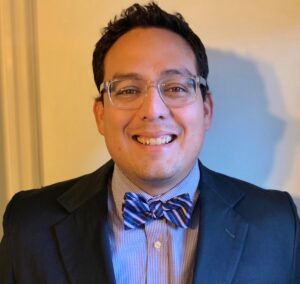
What Does Writing About Teaching Mean to You? Courage and the Affections
In a previous blog, I highlighted courage as a a key factor in teaching. It ultimately pointed to a struggle for the affections of our students. I discussed the importance of winning their affection as a key component of my work as a teacher. It is a valuable step to gain credibility in the classroom. Below, I continue addressing this battle for the affections.
I teach at Pentecostal Theological Seminary. Many of my Academy peers at non-Pentecostal institutions, in Wabash workshops, and in other settings have expressed their interest in Pentecostalism. It is like a hobby or curiosity due to the perceived eccentricity of Pentecostal belief and practice. I have also met many in the Academy who grew up as Pentecostals but are now a part of other religious traditions. Somehow, their experience still informs their identity and they now work in theological education even if it is through different lenses. Others hear the word “Pentecostal” and just raise their eyebrows because of the many misinformed stereotypes.
Perhaps the most groundbreaking work for Pentecostals was Steven Jack Land’s Pentecostal Spirituality: A Passion for the Kingdom (1993). To this day, I understand that it is the all-time best-seller for the Centre for Pentecostal Theology. Land’s title is descriptive for Pentecostalism.[i] Land connects systematic theology and spirituality. For him, Pentecostals are a Wesleyan form of religion similar and different from other streams of Christian thought in that their theology stresses the affections. Post-Land, Pentecostals understand that theological education is about “knowing in one’s mind” (orthodoxy). It is also about “knowing how to do” (orthopraxis). Yet, education also involves feeling or aligning one’s affections or disposition the right way (orthopathos).
My tradition points to the importance of winning and molding the affections of the human being.[ii] This is something that can help us as we teach. Theological education most certainly includes the mind; however, it is much more than rational assent. Theological education is concerned with the student engaging in the right practices, but that is not its end. Theological education is concerned with things that are at stake in our culture and are of utmost importance; as such we are in a struggle for the heart of our generation, for the affections. Nonetheless, the affections must also involve the mind and our practices. Too many Pentecostals love God, but they do not love God with their minds or with their practice. The three (orthodoxy, orthopraxis, and orthopathos) go hand in hand as a perichoretic philosophy of learning, if you will.
My concern is with this latter orthopathic dimension in theological education. Let me clarify, Pentecostals are known for “tongues and drums.” In what I describe I am always conscious of the mind and action. However, religious or theological education must be concerned with orthopathy. This term comes from the Greek roots, ortho and pathos. Ortho refers to the “correct manner” or to a “proper way”; pathos refers to suffering, or in the literal sense, a quality that evokes pity. Theological education must not only be concerned with the right information about God or the right practice. It must also be concerned with producing the right passion, or the right affections, concerning the things of God.
Let me provide an illustration. A person may not know about justice in Scripture or in a particular religious tradition. We do the difficult work of presenting students with this hard intellectual fact. Second, a student may be acquainted with the notion of social justice and may even participate and engage in activities promoting justice or the right social action. However, even in my intellectual knowledge of justice and the right practice of social justice, I must remember the underlying need to love my neighbor as myself – even when this neighbor may not think or act like me. This is a profound affective move that conditions my relationship to all human beings, even if I rationalize that they do not deserve to be treated as such. Thus, orthopathos refers to a gut check about being invested in the right way of being in the world or feeling in the world towards God, neighbor, and self – vertically, horizontally, and dispositionally.
I know this is a brief essay and I may not have time to write more about this. But in my particular tradition (wesleyan-pentecostal), any writing about teaching must include these three dimensions: orthodoxy, orthopraxis, and orthopathy. As a result, theological education must include those elements that evoke the most poignant affections, such as (but not limited to) music, poetry, dance, art, and other media. People wonder what makes Pentecostals grow. It is this radical inclusion into liturgy and beyond (such as the world of the Academy) of this oft-forgotten part of our humanity – the affections. Orthopathos is a powerful composition that produces lifelong learners that are passionate about theology, education, and God. Teaching seeks to live out these vibrant vertical and horizontal relationships.
Notes & Bibliography
[i] There are many different types of pentecostalisms. There are charismatic Pentecostals, third wave Pentecostals, reformed Pentecostals, and anabaptist-like strains of pentecostalism. But I teach at Pentecostal Theological Seminary, a school that traces and articulates the development of its Pentecostalism to the nineteenth-century Holiness Movement (i.e. Phoebe Palmer, Charles Finney, etc.) and eventually to John Wesley (pentecostalism’s grandfather). It is known as “the Cleveland School” for its Wesleyan-Holiness-Pentecostal perspective.
[ii] Jonathan Dean, A Heart Strangely Warmed: John and Charles Wesley and Their Writings (Canterbury Press, 2014).
Leave a Reply